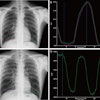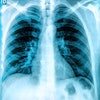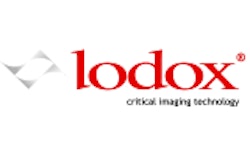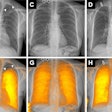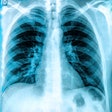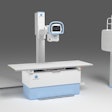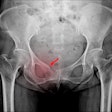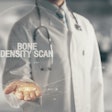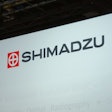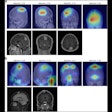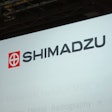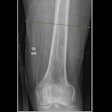Technology used to keep diamond miners honest is at the core of a new low-dose digital x-ray system that’s being debuted at this week’s RSNA meeting. South African firm Lodox Systems will demonstrate its Lodox unit, a charge-coupled device (CCD) system that the company is targeting at trauma and emergency room applications.
The Lodox machine comprises a linear detector made up of multiple CCDs and an x-ray beam. The machine collinearly scans the extremely thin x-rays with CCD detector, clocking the captured electrons at the speed at which the detector arm moves, thereby producing a high signal-to-noise ratio.
"The system is essentially the fastest, most convenient, safest way to get the maximum amount of radiological information," said Herman Potgeiter, general manager of Lodox Systems and the originator and product leader of Lodox’s development. "Essentially, what we do that nobody else does are diagnostic-quality x-rays in 13 seconds of a complete body from head to toe. The whole focus of this technology is to keep the main attending physician with the patient until the follow-up treatment is decided."
Potgeiter stressed the system’s safety, emphasizing that the radiation dosage Lodox emits stands at less than a quarter of the dosage recommended by the FDA. The system has been in clinical trials at Groote Schuur Hospital in Cape Town.
Diamond giant DeBeers International developed the technology behind Lodox, using it to monitor employees and prevent theft. "This had to be the lowest-dose technology possible, otherwise the National Commission for Radiation Protection wouldn’t allow [it]," Potgeiter said. "In the process [of developing the technology], we demonstrated [it] to the medical fraternity. Lodox is actually a request from the medical people to make a special product for them."
"We locked ourselves into think tanks with radiologists and surgeons from Groote Schuur Hospital, and we devised, jointly with them, the form and function of the machine and what it can do, based on the original technology that was developed [by DeBeers]," Potgeiter said.
Officially, Lodox Systems began operations on November 1. The company is jointly owned by DeBeers, South Africa’s Industrial Development Corporation, and NetCare Network Health Care Holdings, the largest hospital group in the Southern Hemisphere.
Lodox’s partner company, African Medical Imaging, has operated for almost a year. African Medical Imaging is a joint venture between DeBeers, the University of Cape Town, and Groote Schuur Hospital, and focuses on future applications of the technology behind Lodox and Lodox peripherals.
FDA approval is pending for Lodox, but Potgeiter said the company has been conferring with the FDA closely during the development process. "We feel pretty confident about our application," he said.
Once FDA-approved, Potgeiter said that the first Lodox model is virtually market-ready. For the upcoming year, the company expects to make Lodox available in sample, beta-test quantities, although it is taking provisional orders at RSNA to test market interest. Lodox Systems plans to price the product in the $220,000-$350,000 range, depending on configuration.
Lodox Systems is looking for equity investors to help the company produce the system commercially, and estimates that it needs $8 million to $10 million in investment capital. The company is also looking for distribution partners.
Meanwhile, the two companies behind Lodox have begun developing its second-generation machine, which will perform both CT images and 13-second x-rays on the same equipment. "It might not be as good as the very best, latest-generation spiral CTs, but it will be at least sufficient for trauma and emergency applications," Potgeiter said.
By Leslie Farnsworth
AuntMinnie.com contributing writer
November 25, 2001
Copyright © 2001 AuntMinnie.com

